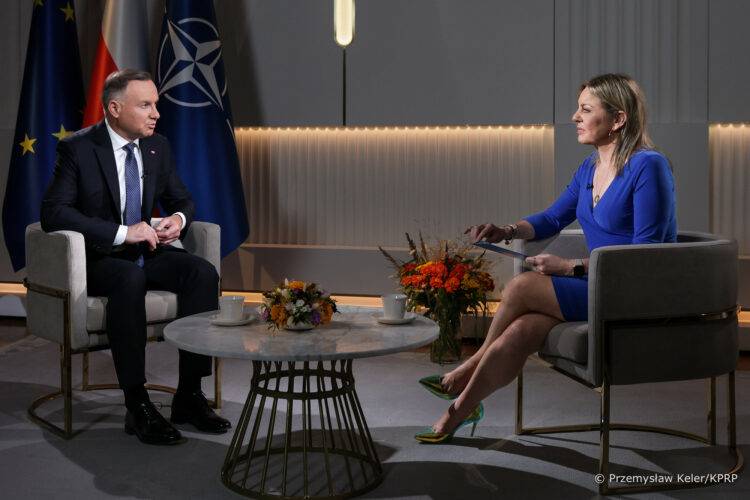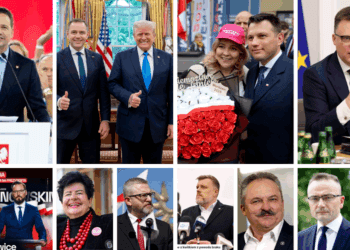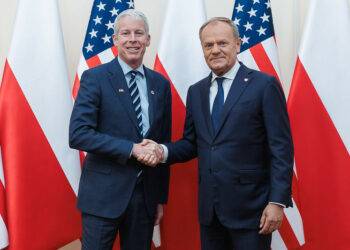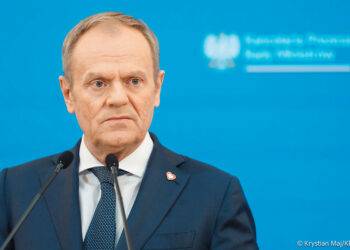Andrzej Duda, the President of Poland, endorsed the government’s resolution to maintain the prohibition on Ukrainian grain sales in the Polish market during his appearance on public broadcaster TVP1; nonetheless, he emphasized the need for maximum transit of this grain to the world’s most impoverished nations.
- More News from Poland on our Homepage.
- Sign up to our Newsletter to receive a weekly recap and stay informed about current events in Poland
- Don’t forget to follow us on Facebook.
The President affirmed that Poland is committed to assisting Ukraine in exporting its grain to the poorest countries in Africa or Asia.
He noted that during the war, a minimal amount of this grain unfortunately arrived in nations where it is genuinely needed, instead over saturating markets like the Polish one. The Polish government, he stated, had to make radical decisions to safeguard Polish farmers, protect our market, and uphold Polish agriculture.
Damaging European Commision’s Decision
The President has highlighted that the European Commission has always backed the governments of Central and Eastern European countries. However, he mentioned that they abruptly changed their stance, choosing not to extend the embargo on the internal export of Ukrainian grain to EU countries – an issue that has indeed become a significant problem. In essence, it is often misrepresented as if Poland was completely prohibiting the import of Ukrainian grain into Polish territory. Nothing could be more misleading and harmful for us – he stated.
“The government’s decision to uphold the ban on Ukrainian grain sales in the Polish market was appropriate; however, every effort must be made to maximize the transit of this grain to the world’s poorest countries,” said @AndrzejDuda in interview with Polish public broadcaster… pic.twitter.com/8BMut24YCR
— Poland-24.com (@poland24com) September 24, 2023
As Andrzej Duda reiterated, special transit corridors are set up, allowing Ukrainian grain to be transported through Poland and dispatched “where it is genuinely needed.” – This export continues to take place – he emphasized. He mentioned that it’s challenging for Poland to reconcile with the EC’s decision not to extend the embargo, assessing that it effectively damages the line of EU countries along the Ukrainian border.
“I believe it’s the right decision that the Polish government has maintained the ban on the sale of Ukrainian grain in the Polish market. However, I firmly believe that we must do everything possible to maximize transit.” – Duda emphasized.
The European Commission initially enforced a ban on the import of wheat, corn, rapeseed, and sunflower from Ukraine to Bulgaria, Hungary, Poland, Romania, and Slovakia in early May as part of an agreement with these countries concerning Ukrainian agricultural products. At first, the restrictions were in force until June 5, later extended until mid-September. The embargo was lifted on September 15 based on a decree by the EC.
“Ukraine’s Complaint
On Monday, Kyiv authorities announced that they had filed a complaint with the World Trade Organization (WTO) against Poland, Hungary, and Slovakia. They alleged these countries had extended their import bans on Ukrainian agricultural products. On Tuesday, a WTO spokesperson confirmed in response to an inquiry from Reuters that they had received Ukraine’s complaint about the food import ban from that nation. He explained that, formally speaking, this can be termed as a request for consultations, representing the first step in legal proceedings.
On Tuesday, Ukraine’s Deputy Minister of Economy and Trade, Taras Kaczka, hinted in an interview with “Rzeczpospolita” that, within a few forthcoming days, Ukraine may enforce an embargo on Polish onions, tomatoes, cabbages, and apples. On Wednesday, in RMF 24, he stated that the enactment of a Ukrainian embargo was the final point of their action plan, and he anticipates it won’t come to fruition. He assured that the first item on Ukraine’s plan was to reach an accord with Poland.
According to a report on Thursday from Reuters, the Agriculture Ministers of Slovakia and Ukraine agreed to establish a licensing system for trade in grain products, which should enable Bratislava to lift its grain import ban from Ukraine. Kyiv authorities agreed to suspend their complaint against Slovakia at the World Trade Organization (WTO).”
- Thank you for reading the article – we’re glad you are with us.
- Follow us on Facebook and Twitter to stay up to date with News from Poland.
- For the most beautiful pictures of Poland – follow us on Instagram.


















